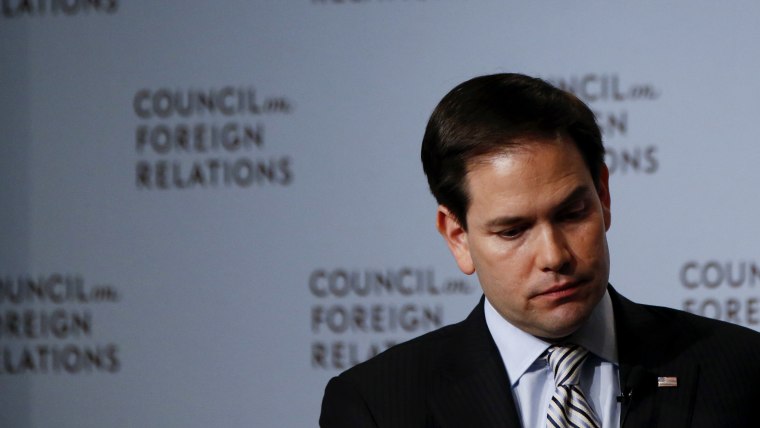As Rachel noted on the show this week, the skies over Syria and its neighbors have been contentious of late. Just this week, Russian jets violated Turkey's air space at least twice, prompting Turkey -- a member of NATO -- to scramble its own jets, intercept the Russian warplanes, and escort them away.
On Wednesday, a U.S. jet bombing ISIS targets in Syria had to reroute its course to avoid Russian warplanes that were flying over the same part of the country.
It's against this backdrop that some presidential candidates -- in both parties -- have raised the prospect of a no-fly zone. Sen. Marco Rubio (R-Fla.) made the case for the idea in an interview the other day with CNBC's John Harwood.
HARWOOD: You think Putin would back off if we had a no-fly zone? RUBIO: I don't think he's going to go into a safe zone, absolutely. I don't believe he will look for a direct military conflict against the United States in order to go into a safe zone. HARWOOD: What if he was? RUBIO: Well, then you're going to have a problem. But that would be no different than any other adversary.
Harwood suggested Americans might have a problem with the idea of a "hot military conflict with Russia." The far-right senator, who's basing much of his candidacy on national security matters, responded, "Sure, but the consequences of not doing anything would scare [the American people] even more."
I don't think that's true. I'm not an expert on Americans' foreign-policy attitudes, but the prospect of a hot war between the United States and Russia is right up there among the scariest international prospects on the planet.
Rubio clearly doesn't see this dynamic the same way, suggesting that if U.S. forces fired on Russian jets over Syrian skies, it would be "no different than any other adversary."
But Russia isn't just another adversary; it's a nuclear power. Wars between nuclear powers tend to be ... problematic.
In the same interview, the Florida senator tried to find a way to blame President Obama for the crisis conditions in Syria.
RUBIO: At the end of the day, this is not an easy situation and we wish we didn't find ourselves here. And in many reasons we are in this position, because what the Obama administration didn't do two-and-a-half years ago when I was advocating for them to do this two-and-a-half ago or a year-and-a-half ago.
Let's be clear about the details, because Rubio seems to have forgotten some of the recent past. It's true that the far-right senator has fleshed out his vision for a U.S. policy in Syria on multiple occasions, but what Rubio doesn't recall is that his approach was effectively identical -- almost word for word -- to President Obama's policy.
And if Rubio wants to talk about what he was advocating in 2013, great. Perhaps he can explain why he voted in opposition to using force against the Assad regime. Rubio said at the time that he's skeptical of U.S. military engagement in Syria.
Salon's Simon Maloy, scrutinizing some of Rubio's statements on Syria last year, described the senator's policy positions as "generally incoherent" and predicated on the assumption "that words don’t actually mean anything."
